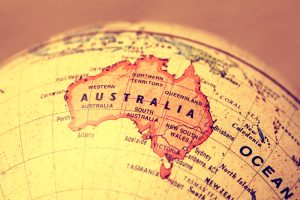Each country has a story that it sells to the world based on what it produces, what its geography entails and what kind of culture it has. For Australia this story has been fairly simple – it’s a country that digs stuff up and ships it overseas and then goes to the beach for a barbeque. While this may overlook much of Australia’s diversity – and also its being an overwhelmingly urban country – it is in general an external image that Australia is comfortable with. Or at least one that the country has made no real effort to change.
This lack of effort is due to two structural issues the country is complacent about. The first is Australia’s own unique resource curse. The conventional resource curse is an observation that countries with an abundance of natural resources often have poor economic growth and development outcomes, alongside weak institutions and corruption. Australia has none of these things, but instead, the country has become so wealthy from its natural largesse that it has felt no reason to do anything else. This accounts for its stark lack of economic complexity – a major problem given that coal and gas are about to fall off a cliff.
The second form of complacency is Australia’s image as a “lifestyle superpower.” Australian cities frequently rank highly in surveys of the world’s “most liveable” and for much of the country there is an ability to be outdoors for most, if not all, of the year. This is an incredibly attractive picture for Australia to project, and the only marketing tool that Tourism Australia has ever felt the need to use.
Yet the rising cost of living means that the advantages of this lifestyle are becoming exclusive. Australia has rocketed up the rankings of the most expensive places to live in recent years, and now finds itself rubbing shoulders with the notoriously pricey Scandinavian countries and Caribbean tax havens. This is an obvious burden for those who are not financially secure, but it also inhibits the creation of one resource Australia hasn’t been blessed with – ideas – and its ability to shift its economic reliance from a small number of big – and uncomplicated – industries.
It cannot be overstated what an economic drag that cost of housing especially is. A lack of housing affordability prevents people from following their own ideas and interests. It forces people to take jobs that they may not want – often unaligned with the skills they possess – in order to simply pay the rent or a mortgage. Expensive housing limits the oxygen creativity needs to flourish.
This is an economic opiate that Australia is addicted to. The notion of measuring Australia’s wealth by the ideas it produces would be utterly perplexing to most of the country. Wealth – and worth – is measured by investment properties, and the competition for an ever-increasing property value is the one true year-round national sport. Despite knowing this is a severe problem, Australian politicians will never intervene in the public’s addiction.
Instead of providing the environment for ideas to flourish in the country, a decade ago the government decided it could just import them instead. The creation of the Business, Innovation and Investor visa was driven by what we could call the “Silicon Valley brain” – the idea that a singular genius will turn up with a new idea that would transform a certain industry, or establish a whole new one, creating untold wealth and boundless new job opportunities. Research indicates that the visa holders have created little investment or innovation, and have actually cost taxpayers money due to generating very small local incomes.
The visa’s failure has been due to a lack of understanding of where ideas come from. Rather than from singular geniuses, they instead come from a critical mass and complex web of small ventures working in an uncoordinated manner. A process of trial and error that hones and polishes, nurtures and grows ideas. Without allowing people the time to think and develop ideas, without the economic security to fail, Australia is stuck just digging stuff up, shipping it overseas, and buying back finished products.
Australia’s broader immigration program also fails to capture people before they have the responsibility of their own families and have both the time and less financial needs to concentrate on their own ideas. While its points-based approach to migration does award more points for youth, the other criteria favor those with experience, with the median age of those arriving in Australia on a permanent skilled visa being just over 30 years old.
As I’ve argued previously, the Working Holiday Maker program offers an almost endless stream of young, educated and enthusiastic people that Australia should be seeking to retain. Rather than valuing salaries, Australia should value those who are willing to live on small income for extended periods in order to pursue their own interests.
In 1964, the academic and journalist Donald Horne released a book called “The Lucky Country.” The book’s title was a critique of Australia – an assessment that the country’s success has been built on good fortune, not effort or ingenuity. A modern update might instead refer to Australia as The Complacent Country – sunning itself on the beach, oblivious, or unwilling to address its major structural problems.

































